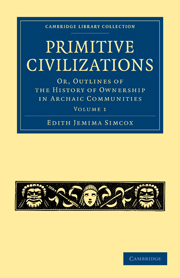Book contents
- Frontmatter
- PREFACE
- Contents
- CHAPTER 1 INTRODUCTION
- CHAPTER II PREHISTORIC PROBLEMS
- BOOK I OWNERSHIP IN EGYPT
- CHAPTER I THE MONARCHY AND THE ROYAL OFFICERS
- CHAPTER II THE ECONOMIC ORDER
- CHAPTER III COMMERCE AND INDUSTRY
- CHAPTER IV CASTE AND DESCENT
- CHAPTER V THE MILITARY CLASS
- CHAPTER VI THE NATIONAL RELIGION AND THE PRIESTHOOD
- CHAPTER VII CIVIL LAW AND CUSTOM
- CHAPTER VIII DOMESTIC RELATIONS AND FAMILY LAW
- BOOK II ANCIENT BABYLONIA
- BOOK III FROM MASSALIA TO MALABAR
CHAPTER II - THE ECONOMIC ORDER
Published online by Cambridge University Press: 07 September 2011
- Frontmatter
- PREFACE
- Contents
- CHAPTER 1 INTRODUCTION
- CHAPTER II PREHISTORIC PROBLEMS
- BOOK I OWNERSHIP IN EGYPT
- CHAPTER I THE MONARCHY AND THE ROYAL OFFICERS
- CHAPTER II THE ECONOMIC ORDER
- CHAPTER III COMMERCE AND INDUSTRY
- CHAPTER IV CASTE AND DESCENT
- CHAPTER V THE MILITARY CLASS
- CHAPTER VI THE NATIONAL RELIGION AND THE PRIESTHOOD
- CHAPTER VII CIVIL LAW AND CUSTOM
- CHAPTER VIII DOMESTIC RELATIONS AND FAMILY LAW
- BOOK II ANCIENT BABYLONIA
- BOOK III FROM MASSALIA TO MALABAR
Summary
FERTILITY AND FOOD.
The history of the most ancient empires of the Old World presents us with a choice of mysteries. Sometimes our difficulty is to explain the past greatness of a land which seems now so little fitted to be the seat of empire; and sometimes, again, we are at a loss to account for the departure of political supremacy from countries which still continue the especial favourites of Nature. Egypt, the land of paradox, confronts us with the latter problem. Centuries before the beginning of our era, the immense duration of Egyptian civilization ranked among the marvels of history; and while this marvel has lost none of its strangeness for later ages, with their accumulating examples of contrasted instability, the explanation of the decay and death of this civilization has now to be joined with that of its grandeur and duration.
The conviction is gaining ground among historians that the political decay of nations is always prepared or preceded by profound if secret economic disorganization. If this be so, we have to ask: By what secret did the Egypt of the Pharaohs succeed in escaping the doom of such disorganization for a period trebling the duration of the most stable monarchies of the West?
The qualities of climate and race do not make up history by themselves, but the solution of the problem may be found in the almost unique juxtaposition of a climate, a race, and a form of government—all of them stable in themselves and co-operating, by their most strongly marked characteristics, to perpetuate a modus vivendi, which was at once the product and the condition of sustained equilibrium.
- Type
- Chapter
- Information
- Primitive CivilizationsOr, Outlines of the History of Ownership in Archaic Communities, pp. 65 - 93Publisher: Cambridge University PressPrint publication year: 2010First published in: 1894



